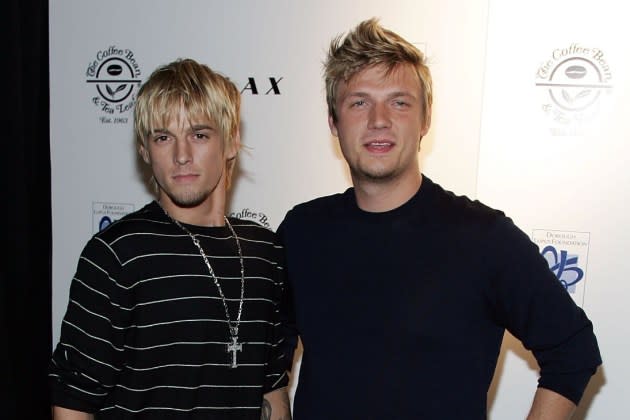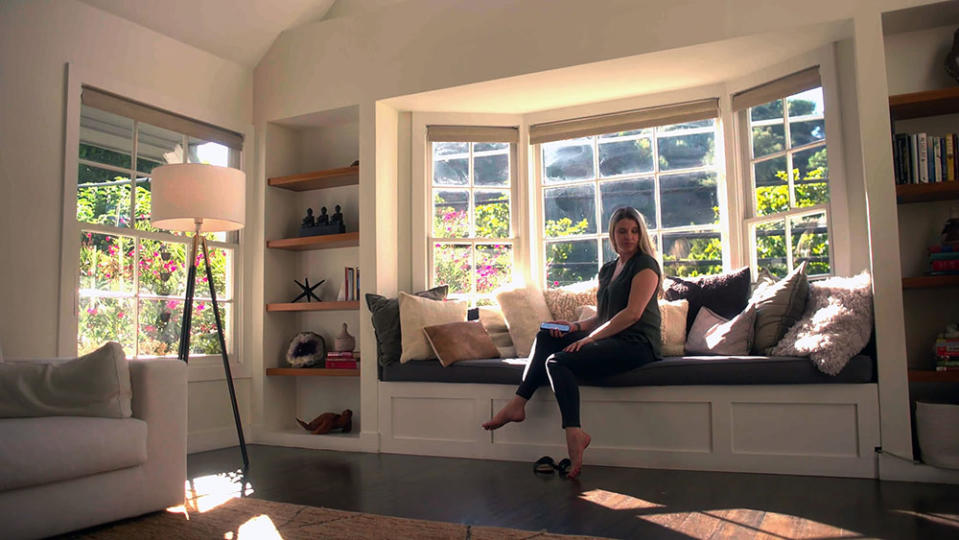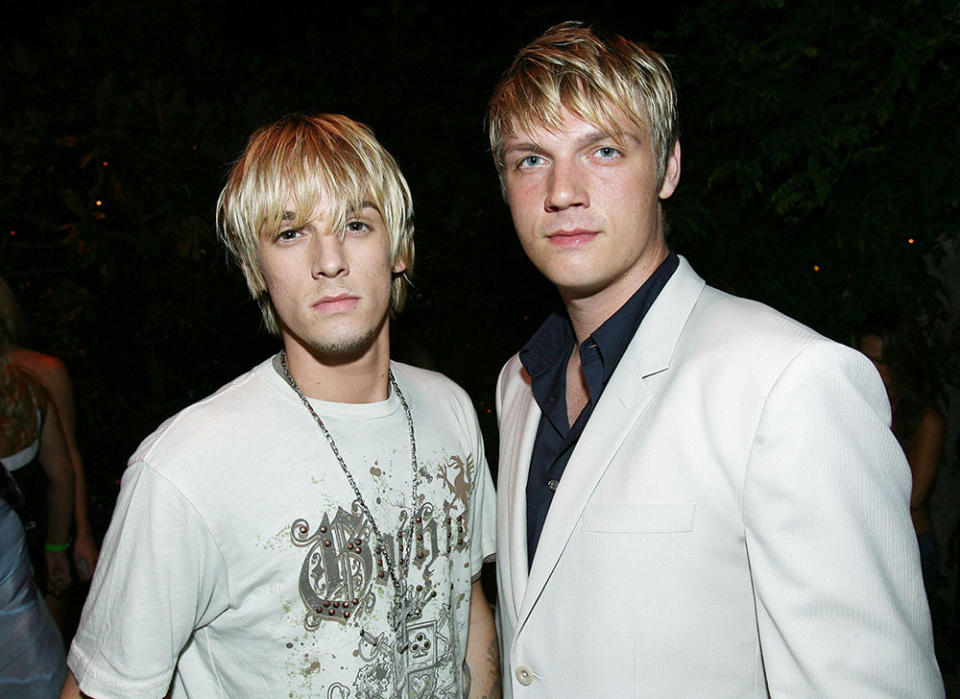‘Fallen Idols’ Team on Detailing Nick Carter Allegations, Aaron Carter Struggles: “A Really Nuanced Story”
- Oops!Something went wrong.Please try again later.

Investigation Discovery’s newest docuseries Fallen Idols: Nick and Aaron Carter dives into the allegations of sexual assault against Backstreet Boys frontman Nick Carter and brother Aaron Carter’s struggles with mental health and substance abuse.
The four-part series, which airs Monday and Tuesday, spends its first two episodes introducing Melissa Schuman, a former member of pop girl band Dream, who was the first woman to publicly come forward, in 2017, to allege that Nick Carter sexually assaulted her.
More from The Hollywood Reporter
Nickelodeon Alum Daniella Monet Won't Watch 'Quiet on Set' but Says She "Came Out Unscathed"
Every Actor Who Has Spoken Out Following 'Quiet on Set' Revelations
Schuman spoke out when the #MeToo movement was rocking the entertainment world. Two other accusers — Ashley Rapp and Shay Ruth — subsequently revealed their own accusations of assault. Over the course of four episodes, Schuman, Rapp and Ruth open up about their stories and the backlash they’ve received since coming forward to accuse someone as beloved by the band’s superfans as Nick Carter.
The second half of the docuseries explores Aaron Carter’s struggles, some of which began when he spoke out in support of the survivors who alleged his brother had raped them, causing their relationship to fracture before Aaron Carter died in 2022 at age 34.
For ID president Jason Sarlanis, incurring the wrath of the BSB Army for Fallen Idols wasn’t much of a concern. “Regardless of the subject matter, when anybody’s brave enough to share their story — as the three women who are featured in this docuseries did — we want to use our platform to empower them and give them a voice,” the network head tells The Hollywood Reporter. “Regardless of who they might be speaking about, we want to empower the survivors and not be so focused necessarily on the potential perpetrator.”
Below, Sarlanis, along with Fallen Idols showrunner Elissa Halperin and executive producer Michael Hirschorn, explain why this is the right time for the docuseries, discuss how it’s taken so long for the #MeToo movement to hit the music industry and share their hopes for the four-parter.
***
What concerns did you have about going after someone as beloved by fans as Nick Carter?
ELISSA HALPERIN The fact that there is such a fan base makes it a relevant story to look at. These are lawsuits that are happening, and it feels like a very topical story because of that.

How long have you all been working on this docuseries?
MICHAEL HIRSCHORN The project was initiated by an excellent producer, a British producer named Natasha Bowler. She had been working on a different project about #MeToo in the music business and built up a number of connections and relationships. She initially built the relationships with the three women featured in the documentary, interviewed them and then brought the project to [my company] Ish Entertainment. And then, really, there was a process by which the trust had to be transferred to us, and then ultimately to Elissa as the showrunner to make sure that the women knew that we were going to treat them as well as Natasha had.
I initially talked to Jason in the fall of ’22. I think we’d brought the project out shortly before Aaron Carter died, and it was actually a much more straightforward project at the time. And then as we were taking it out, we got the horrible news about his death. And then Jason really challenged us to expand the scope of the project and to kind of knit together the story of Aaron and Nick with the story of the three women, which I think made the whole story much more powerful and made it a lot more dimensionalized and richer, and I think just elevated it from a kind of simple story to one that had so many different elements. Ultimately, we had to expand it from three to four episodes.
Why did you choose to air it now?
JASON SARLANIS In terms of the why now from an airing perspective, it’s kind of a confluence of two things. One, we’re here to support these survivors, and this is where they are on their journey. And this is a snapshot in that particular moment of time. So, in terms of doing right by them, we want to air it quite timely to the moment that they sat down in front of cameras. So, that’s part of the impetus. And the other part of it is that the ID brand as a platform is maturing and evolving. We’re now at a place post-some of the other documentaries we’ve done in tangential spaces, like Quiet on Set, to really give this documentary the platform it deserves and the reach it deserves.
Why was ID the right place for Fallen Idols?
SARLANIS I can let Ish speak to why Michael was, I would say, brilliant enough to believe that we were the correct home. (Laughs.) But, from an ID perspective, we really consider ourselves the original home of investigative documentary series and pride ourselves on our mission to use that platform to give victims and survivors a voice. At the heart of what this documentary is, it really is these three women, so we think we are the perfect place for them to share their story.
HIRSCHORN We had a lot of interest in the project. Jason immediately stepped up, and, as a former network exec, I really respect a network exec who was willing to say, “Yes, I want to do this. I want to commit to it now.” And who trusted us and supported us throughout the process. One of the things that’s been really remarkable about working with Jason and the whole team is they’ve been really strong partners and have challenged us to make it better. They’re not going to shy away from difficult material. They’re really determined to make sure we make the best possible project. So, that really struck me both watching what ID had been doing two years ago and has continued to do. So, I’m very happy we made that decision.

Jason, what did you think when they brought it to you?
SARLANIS I think it’s a good example of where the subject matter and the filmmakers intersect perfectly. Michael has such a history of understanding the pop culture music space, given his own career, especially when it comes to his time as a network executive. He’s intimately aware of the many layers that go into being part of the pop culture megadome that Nick and Aaron were both a part of, and I think that gave him a really unique perspective on how to tell this story. Not to mention, his experience and journalistic integrity to make sure we’re doing this story right. So, when he sat down with me over drinks, actually, and said that this was a passion project of his and one that he was ready to kind of birth into reality, I instantly jumped at the opportunity to work together with him.
HIRSCHORN Elissa is somebody who we found through ID, but she’s a very journalistically rigorous showrunner. I had a lot of comfort in the fact that she was a really strong backstop, who could look at material. We were wading through, in one case, 350 pages of legal documents that were dropped on our front door. It takes somebody with a very high level of intelligence and patience and stick-to-itiveness, and lack of ADD, to have the patience to go through hundreds of documents and compare them and sort of figure out a narrative throughline that reflects accurately what those documents say.
SARLANIS If I can pour on to the love affair of all things Elissa, this is a really nuanced story and a story that not just explores the difficulties of sexual assault, but also histories of substance abuse, really tragic, dark, family dynamics, and how intergenerationally that has affected these two young men. Elissa, in her history with us alone, I mean, has done documentaries in similar spaces and brings a real sense of expertise to the subject matter in all its different applications.
Elissa, can you talk to me about how showrunning works on a docuseries. Many people think of showrunners as writers, but these were women telling their own stories.
HALPERIN Being brought on to this show was really an honor and a privilege to work with Jason again, and to work with Michael and the team at Ish for the first time. It was a privilege to be asked to participate in this.
For me, there was a personal element to it. I came of age when these two young men were coming up. So, I had that personal nostalgic connection to it. I really wanted to look at the big picture of, how do two men who were on top of the world 25 years ago wind up where we are now — which is, one has been accused of very tragic things and one is no longer with us, which is tragic as well.
My approach is to look at everyone’s story and try to give everyone space for their point of view, and to figure out how all of those pieces connect in a way that’s fair and that honors the women and their intentions as well as understanding the challenges of presenting something that is evolving and wanting to get the voice and perspective of someone who opted not to personally participate.

Why do you think it’s taken so long for the #MeToo movement to hit the music industry despite taking the film industry by storm in 2017?
HIRSCHORN Well, one thing I can point to, as has Jason, I’ve spent much of my career kind of adjacent to the music business, and a lot of the power structures in the music business really haven’t changed in the last several decades. The thing that really broke it open — and we were talking about when I was talking to Jason in late 2022 — were various look-back laws that had that were going to come into effect in 2023, which allowed alleged victims to take action that they couldn’t take previously because the alleged incidents had happened too long ago. So, I think this new wave is being driven, at least in part, by a new legal openness of the court system in California and also in New York to open the window, particularly for civil suits.
And so, as 2023 started, there was suddenly this wave of stories, and it really is kind of #MeToo 2.0, but I think with a key difference. The other interesting element of this story is, unlike #MeToo 1.0, the accused are being far more aggressive in their defenses than they were the last time around. I think part of this story is the degree to which Nick Carter is not backing down from his protestations of innocence, and is using his legal might and resources to fight back against the women and make pretty serious accusations against them in turn.
HALPERIN It seems like also, I think, guilty or innocent, several years ago, people would just kind of shrink back and shy away no matter what sort of the allegations were just because of the PR aspect. But, I think now, someone like Nick, who really is maintaining his innocence, he is determined to prove that in court and to assert that.
What do you hope the audience response will be, and what change do you hope Fallen Idols brings?
HALPERIN To be able to have these conversations would be a really great outcome. For people to listen to each other, to hear each other, and to find space for nuance and grace.
SARLANIS I think for survivors of sexual abuse, for survivors of substance abuse, for this documentary, to allow people to bring into the light their own experiences and have needed conversations. If this documentary does that, if it helps even just a few people feel OK, then it’s done its job.
HIRSCHORN There’s a need that people of a certain age and people of all ages have in reckoning with a moment in their childhood, or the moment in their teens, or the moment in their early adult lives and coming to terms with how much things have changed in the last 20 years — and how much things remain the same.
So if we did our jobs correctly, you both have a sense of nostalgia and a sense that, “Wow, was it a different time.” It’s only 20 years ago, but it could be ancient history, and I think it gives people an opportunity to reflect on how they’ve changed, how the culture has changed and also the work that still needs to be done. Then, we’ll have done our job.
Fallen Idols releases across two nights, with its first two episodes dropping on ID and Max on May 27 and its final two on May 28 from 9 – 11 p.m.
Best of The Hollywood Reporter

